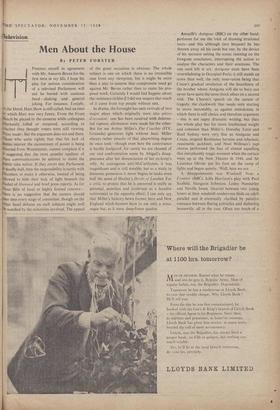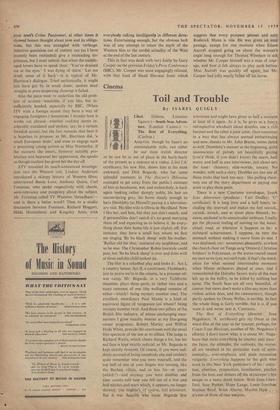television
Men About the House
By PETER FORSTER
FINDING myself in agreement with Mr. Aneurin Bevan for the first time in my life, I hope his plea for serious consideration of a televised Parliament will not be buried with cautious head - shaking and general joking. For instance, Tonight, hs the Derek Hart Show is still called, had an item iIi which Hart was very funny. From the Front Rench he played to the cameras while colleagues alternately lolled or simpered, according to whether they thought voters were still viewing. Point made: but the argument does not end there. 'Nose who quite rightly fear that for lack of Public interest the mainstream of power is being diverted from Westminster, cannot complain if it IS suggested that the most popular medium of mass communications be enlisted to make the Public take notice. If they retort that Parliament IS deadly dull, then the responsibility is surely with Members to make it otherwise, instead of being allowed to hide their lack of light beneath the bushel of Hansard and brief press reports. As for those Bills of local or highly limited concern— there is no suggestion that the camera should Peer into every stage of committee, though on the Nher hand debates on such subjects might well be watched by the minorities involved. The appeal
of the great occasions is obvious. The whole subject is one on which there is no irresistible case from any viewpoint, but it might be more than a pity to assume that compromise need go against Mr. Bevan rather than to make his pro- posal work. Certainly 1 would feel happier about the resistance to him if I did not suspect that much of it came from top people without sets.
In drama, the fortnight has seen revivals of two major plays which originally were also pieces d'occ:asion: one has been received with deferen- tial rapture, allowances were made for the other. But for me Arthur Miller's The Crucible (ITV, Granada) generates light without heat. Miller always rather smacks of that playwriting degree he once took—though even here the contrivance is hardly foolproof, for surely we are cheated of our real confrontation scene by Abigail's disap- pearance after her denunciation of her ex-lover's wife. As courageous anti-McCarthyism, it was magnificent and is still notable, but as a study in themonic possession it never begins to make even half the sense of Huxley's Devils of Loudun. For a critic to protest that he is unmoved is really as personal, pointless and irrelevant as a laxative testimonial to the opposite effect; I can only say that Miller's hickory-hewn farmer hero and New England witch-hunters have to me only a statu- esque but, as it were, deep-frieze quality.
Anouilh's Antigoith (BBC) on the other hand, performs for me the trick of drawing irrational tears—and this although (not because) he has thrown away all his cards but one, by the device of his narrator setting the scene, insisting on the foregone conclusion, interrupting the action to analyse the characters and their emotions. The one card left is art. Antigone must have been overwhelming in Occupied Paris; it still stands up more than' well, the only reservation being that Creon's gradual revelation of the beastliness of the brother whom Antigone will die to bury can never have quite the same shock effect on a second visit. The Chorus's speech on the nature of tragedy, the clockwork that needs only starting to move •inexorably, as against melodrama in which there is still choice and therefore argument --this is not super dramatic writing, but then the whole play has far more intellectual weight and cohesion than Miller's. Dorothy Tutin and Basil Sydney were very fine as Antigone and Creon, original Resistance heroine and reluctant, reasonable jackboot, and Noel Willman's rapt chorus performed the feat of almost equalling that inexplicably magic moment when the curtain went up at the New Theatre in 1944, and Sir Laurence Olivier put his foot on the ramp of lights and began quietly, 'Well, here we are. . .
A disappointment was Windmill Near a Frontier (BBC), John Harrison's play with Paul Scofield, Margaret Johnston. Lesley Nunnerley and Neville Jason. Quarrel between two young lovers at their windmill rendezvous finds an adult parallel and is eventually clarified by putative romance between fleeing politician and sheltering housewife; all in the rain. Often too much of a poor man's Crime Passionnel, at other times it showed honest thought about love and its obliga- tions, but this was strangled with verbiage. Selective quotation out of context can (as I have recently been reminded) give a misleading im- pression, but I must submit that when the middle- aged lovers have to speak thus : 'You've drained me at the eyes.' .1 was dying of thirst.' Let me drink some of it back'—it is typical of Mr. Harrison's dialogue. Tried sardonically, it might just have got by in small doses; spoken dead straight in pore-inspecting close-up it failed.
Also the piece went to underline the old prob- lem of accents—insoluble, if you like, but in- sufficiently heeded, especially by BBC. (When ITV wish a foreign accent they have a way of engaging foreigners.) Sometimes I wonder how it works out abroad--whether cockney seems in- tolerable translated and spoken, say, in a certain Swedish accent, but the fact remains that here it is hopeless to propose, as Mr. Harrison did, 'a small European State,' and even to engage such a promising young actress as Miss Nunnerley, if the moment she enters, however suitably pro- letarian and bejeaned her appearance, she speaks as though modom has given her the day off.
ATV mounted its much-announced investiga- tion into the Western cult. Lindsay Anderson introduced a skimpy history of Western films; interviewed Bessie Love, Anthony Quinn, Carl Foreman, who spoke respectively with charm, semi-relevance and pungency about the subject. Mr. Foreman called TV Westerns 'threadbare'— and is there a better word? Then to a studio discussion between Foreman, Richard Hoggart, Hilda Hitnmelweit and Kingsley Amis, with everybody talking intelligently in different direc- tions. Entertaining enough, but the obvious lack was of any attempt to relate the myth of the Western film to the sordid actuality of the West • at the end of the last century.
This in fact was dealt with very fairly by Gary Cooper on the previous Friday's Press Conference (BBC). Mr. Cooper was most engagingly relaxed, with that kind of bland film-star front which suggests that every prospect pleases and only Roderick Mann is vile. He was given an easy passage, except for one moment when Eileen Ascroft stopped going on about the woman's angle long enough for Thomas Wiseman to ask whether Mr. Cooper himself was a man of cour- age, and how it felt always to play such heroes. Miss Ascroft was quickly off again, but Mr. Cooper had jolly nearly fallen off his horse.











































 Previous page
Previous page